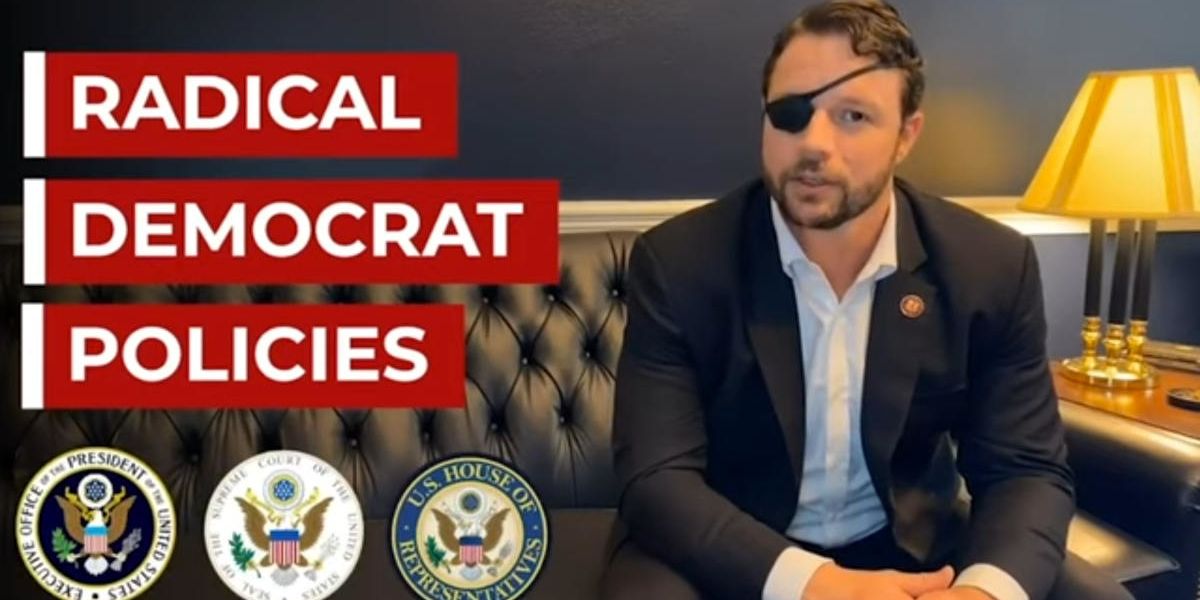

Republican Rep. Dan Crenshaw (Texas) warned in a video that Democrats would dismantle the country in a video highlighting radical legislation advanced by the Democratic majority in the House over the past two years.
"In two minutes, I’m going to tell you about all the radical Democrat policies that passed out of the House this session," Crenshaw said in the video. "Ever wonder what it would be like if they had all three branches of government?"
Watch:
Dan Crenshaw: Radical Democrat Policies www.youtube.com
Crenshaw highlighted 10 bills that have passed in the House. If there were currently a Democratic majority in the Senate and a Democratic president, they could have become law.
Here are the 10 bills:
- H.R. 1, the For the People Act, would overhaul the U.S. election system. It would impose new restrictions on lobbying that are so severe the left-leaning American Civil Liberties Union blasted the bill as unconstitutional on First Amendment grounds. The bill also would provide public funding for political campaigns. "They’re going to use your tax dollars to pay for political campaigns," Crenshaw said. "Six-to-one match for small-dollar donations. That ends up being billions of dollars in taxpayer funding for bad political ads.
- H.R. 3, the Lower Drug Costs Now Act, would impose foreign price controls on the U.S. market, lowering drug prices but also cutting into pharmaceutical company revenue that would otherwise be used to reinvest in research for new cures for disease. One study showed this policy would reduce the Medicare Part D revenues for U.S. companies by $358 billion over the next five years, a 58% reduction before interest and taxes. The study found that such a drastic reduction would reduce the number of new medicines brought to market by as much as 88% across the U.S. Crenshaw cited a Congressional Budget Office report that estimated eight fewer drugs would be brought to market in the U.S. between 2020 and 2029 and 30 fewer drugs over the subsequent decade.
- H.R. 8, the Bipartisan Background Checks Act, is a bill that would require universal background checks for gun purchases. Gun Owners of America has said the bill would criminalize private firearms sales that were not pre-approved by the government. The bill would outlaw the "transfer" of a firearm without a background check. "Transfer" is not defined in the bill, and Crenshaw suggested that borrowing your neighbor’s gun may be a felony if this bill were law.
- H.R. 6, the American Dream and Promise Act, is legislation that would grant amnesty to as many as 2.5 million illegal immigrants brought to the U.S. as minors or who have been in the United States on temporary protected status. The legislation also would provide a path to citizenship and voting rights for those who qualify and cost $34.6 billion while providing no additional border security measures.
- H.R. 9, the Climate Action Now Act, would force the Trump administration to reverse the president’s decision to withdraw from the Paris climate accords and require Trump to develop a plan to drastically cut U.S. carbon emissions by 2025. The Heritage Foundation conducted an analysis that found Obama-era regulations designed to meet that emissions target would raise electricity prices by between 13% and 20%.
- H.R. 2472, the Protecting the Right to Organize Act, is sweeping legislation to reform labor relations law that, according to the Competitive Enterprise Institute, would "preempt state labor laws, overrule three Supreme Court decisions, and transform the National Labor Relations Board (NLRB) from a remedial body to a punitive one." "It actually forces workers to pay union dues, even if they don’t want to," Crenshaw said.
- H.R. 1644, the Save the Internet Act, would reimpose net neutrality regulations. Federal Communication Commission Chairman Ajit Pai killed the original regulations in 2017, and since then internet speeds have increased, while dire predictions from the left about greedy internet service providers taking advantage of consumers have not come true.
- H.R. 5, the Equality Act, would make sexual orientation and gender identity a protected class under the Civil Rights Act of 1964 and the Fair Housing Act. Conservatives believe the anti-discrimination provisions of proposed laws like the Equality Act endanger religious liberty by being overly broad and inadequately defining what constitutes discrimination on the basis of sexual orientation or gender identity. Protections for transgender Americans would also make it illegal to prohibit men who identify as women, for example, from competing in female sports. Crenshaw said the bill would give the government power to "federally enforce the ability of men to play in women’s sports, ending women’s sports forever."
- H.R. 582, the Raise the Wage Act, would raise the federal minimum wage to $15 an hour, imposing new costs on businesses and, according to Crenshaw, eliminating 4 million jobs. "Remember, a business’ budget doesn’t change just because the government tells it to. It’ll just hire less workers," Crenshaw said.
- H.R. 51, the D.C. Admissions Act, would make Washington D.C. the 51st state. "Why?" Crenshaw asked rhetorically. "So the Democrats can get two new senators."
"And that’s on top of defund the police, abolish ICE, make excuses for China, make excuses for Antifa, abolish the Electoral College, abolish the filibuster," Crenshaw added. "It’s a dismantlement of our country of our country in America and her institutions. Remember that."
via Conservative Review
Enjoy this article? Read the full version at the authors website: https://www.conservativereview.com/
